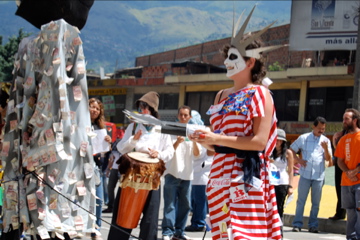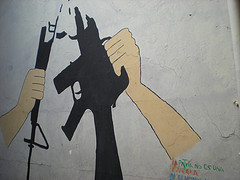The Red Juvenil of Medellín, Colombia

In one of the improvised poor neighborhoods that cling to the bare mountain slopes on the edge of Medellín, Colombia’s second largest city, the paramilitary was preparing to forcibly recruit a local youth named Alberto. Most people can’t imagine resisting such a demand. But Alberto said no, he was not interested, so the paramilitary threatened him. Alberto contacted the Red Juvenil de Medellín (Medellín Youth Network), with whose support he organized a community bonfire in his neighborhood. Around the fire that night, he talked about the network, saying he had a different vision and refused to join any armed group. He asked for everyone’s solidarity and respect for his decision. “He converted the community,” says Leonardo Jiménez, a leader of the network. Alberto still has his support group. And if he has some difficulty or security problem, he contacts his support group, which has a plan to put him in someone’s house. Some put word out on the Internet, while others compile his case and do legal work if needed.
Alberto’s situation and hundreds like his have inspired a youth movement in Colombia that is challenging the state’s right to force youth to participate in the country’s bloody civil war, which has been going on for more than four decades. The movement’s premises are simple: they want the right to say no to participating in Colombia’s cycles of violence.
One of the pioneering organizations of this movement is the Red Juvenil de Medellín, or the Medellín Youth Network. The Red Juvenil is a youth organization that operates explicitly on principles of nonviolence. In doing so, the organization challenges the status quo in Colombia, which dictates that youth from a barrio popular, or poor neighborhood, have three options: fulfilling their mandatory service to the military and perhaps dying or killing in the conflict between the state, paramilitary groups, and the FARC and ELN (guerrilla groups); joining the paramilitaries, the drug trade, or a guerrilla group; or being part of the masses of unemployed.
Started in 1990 by young people who had lost loved ones to the armed conflict, the group trains youth in nonviolence and cooperative play; supports young men who refuse to serve with the police, military, or illegal armed groups; and promotes nonviolence, civil disobedience, human rights, and conscientious objection by means that contribute to the construction of a demilitarized society. A core group of about 30 young people works out of the group’s office and gathering space, a large house not far from the city center. Another 150 youth organized into neighborhood and issue groups are regularly involved in their activities.
Sandra Grisales, an organizer with the Red Juvenil, explained, “We are here as a group of young people imagining that a different world is possible … because we think the same way, and because we are celebrating our right to think freely. For me, injustice doesn’t help me at all, and I will not be part of continuing it.”
The Red Juvenil’s first members came together for mutual support. They wanted to challenge the stigma that equates youth with violence by making their pacifist views public. Their first actions were spontaneous responses to violence in the city and included processions from the poor hillside neighborhoods that ring the city, with music and theater that expressed the participants’ rejection of violence.
Later, members of the organization learned about other conflicts around the world and about ideas that were new to them, such as nonviolence and conscientious objection. Some members visited antimilitarist groups in Spain and learned more. They decided that the time for simply criticizing the state of affairs in their country had passed and that they needed to demonstrate affirmatively the kind of world they wanted to live in. They started offering nonviolence training outside of their own gatherings, taking their workshops into schools and neighborhoods where there was conflict. At the same time, they began to expand their antimilitarism and human rights work to include nonviolent direct action.

The network’s activities have included evocative and powerful sidewalk theater performances, public draft-card burning, and leafleting induction lines under the gaze of soldiers. Preparation for these actions is intensive and includes coaching, role-playing, and other exercises designed to build confidence and to teach the principles and practice of active nonviolence. The organization has also spoken out against U.S. military policy in Colombia, for example, publicly criticizing the U.S. government’s recent decision to relocate the U.S. military base in Manta, Ecuador, to Colombia.
The heart of the network’s mission is to encourage young people’s to value all human life, to work together to overcome fear, and to be empowered to live and espouse these values. Their conscientious objection project exemplifies this approach. Male Colombians graduating from secondary school are required to serve a year in the police or the army, and there is no provision for alternative service or refusal on grounds of conscience. Those who do refuse are barred from higher education and from many jobs. The network provides support to conscientious objectors in addition to publicizing the issue of conscientious objection in the media and on the street.
Support for conscientious objectors in Colombia is crucial because every armed group in the Colombian civil war—paramilitaries, guerrillas, and the “official” state army—carries out forced recruitment, or obligatory service. For the members of the Red Juvenil, visiting barrios populares and seeking out youth means meeting up with the armed groups, who often challenge them. Some youth who have gone to neighborhoods to promote the network have experienced armed battles.
Says Leonardo Jimenez, a conscientious objector, “The majority of the youth in the network have a history with the violence. They have been victims; a family member has been killed, or a friend, or they’ve seen killing directly. They are people who have lived the presence of violence, have lived that pain. And they are looking for another possibility. It is as if you were in a gray panorama, and then there is this group that fills you with colors. You would want to stay involved, wouldn’t you?
“There is talk in Colombia about an armed revolution. But for us, revolutions are not made with weapons. ‘Revolution,’ what is it? To renovate, to create, to invent. … But war was invented long ago, and so were weapons. There’s no revolution; they are not revolutionizing anything. To us, they are all just armies.”
